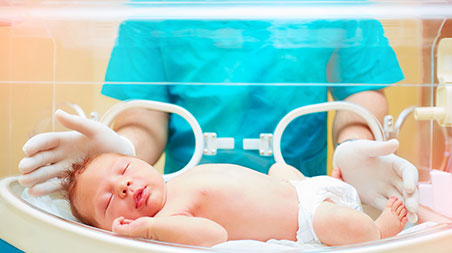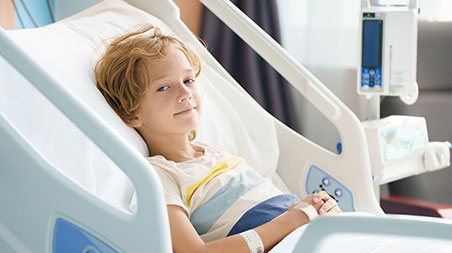
Paediatric surgery
The Paediatric Surgery Service at Olympia Centro Médico Pozuelo treats a wide range of conditions, from minor abnormalities to complex malformations that require long-term monitoring.
Care often begins with prenatal diagnosis and continues until the age of 16, covering areas such as neonatal surgery, paediatric urology, and complex thoracic, hepatobiliary, or abdominal surgery.
We always work with minimally invasive, multidisciplinary techniques, offering both children and families comprehensive, safe and humane care.
Pathologies treated

Neonatal surgical pathology
Neonatal surgical pathology encompasses congenital malformations that require surgical intervention in the first days of life. It includes conditions such as intestinal atresia, diaphragmatic hernias, gastroschisis, and urinary tract abnormalities. Early diagnosis, often prenatal, and specialised management are essential to improve the survival and quality of life of the newborn.

Surgical pathology of the respiratory system
Surgical pathology of the respiratory system in paediatrics includes congenital or acquired malformations affecting the airways and lungs, such as chest deformities (pectus carinatum, pectus excavatum and others), malformations, tracheobronchial lesions, lung malformations, etc. These conditions can compromise breathing and require specialised assessment. Treatment is usually surgical and aims to restore respiratory function, relieve symptoms and prevent complications.

Surgical pathology of the digestive system
Surgical pathology of the digestive system in paediatrics encompasses oesophageal surgery, gastro-oesophageal reflux (GER), anorectal malformations, Hirschsprung’s disease, inflammatory bowel disease, intestinal surgical rehabilitation or autologous bowel reconstruction, placement of devices for enteral nutrition, vascular access, etc. These pathologies can cause obstruction, bleeding, or nutritional disturbances and require early diagnosis and surgical intervention to restore digestive function and prevent complications.

Paediatric oncology pathology
Paediatric surgical oncology encompasses solid tumours in children, such as neuroblastomas, nephroblastomas (Wilms tumour), hepatoblastomas and teratomas, metastases, vascular accesses, etc. The paediatric surgeon participates in the diagnosis, biopsies and removal of tumours, in coordination with oncology and other specialities. Treatment seeks to remove the tumour, preserve organ function and improve prognosis, always adapted to the child’s age and development.

Hepatobiliary surgical pathology
Hepatobiliary surgical pathology in paediatrics includes diseases of the liver, gallbladder, and bile ducts that require surgical intervention. Among the most common are bile duct atresia, choledochal cysts and certain liver tumours. Malformative and non-malformative, derivative and non-derivative surgery for portal hypertension, treatment of complications, etc. These conditions can cause jaundice, infections, or liver failure. Surgical treatment aims to restore bile flow, remove lesions and preserve liver function, with a multidisciplinary and specialised approach being key.

Burns
This includes acute treatment and treatment of sequelae. It covers thermal, electrical, or chemical injuries that affect the skin and, in severe cases, deeper tissues. Surgical management includes cleaning, debridement, and covering wounds with grafts to promote healing and prevent infection. Early, comprehensive, and specialised care is essential to minimise functional and aesthetic sequelae and to support the child’s physical and emotional recovery.

Vascular abnormalities
The pathology of vascular abnormalities in paediatrics includes malformations and tumours of the blood vessels, such as angiomas, lymphangiomas, haemangiomas, and arteriovenous or lymphatic malformations. They can affect the skin, internal organs, or extremities, causing pain, bleeding, deformity, or functional impairment. Treatment depends on the type and location, and includes observation, medication, minimally invasive procedures, or surgery. A multidisciplinary approach is essential for safe and effective management.

Emergency surgical pathology
Emergency surgical pathology in paediatrics include abdominal, thoracic, traumatic and infectious conditions, malformations, and the removal of foreign bodies from the digestive and respiratory tracts, etc. Among the most common are acute appendicitis, intussusception, strangulated hernias, abdominal trauma, and testicular torsion. Rapid diagnosis and timely treatment are essential to reduce complications. The paediatric surgeon acts quickly and precisely to stabilise the patient and resolve the underlying cause.




